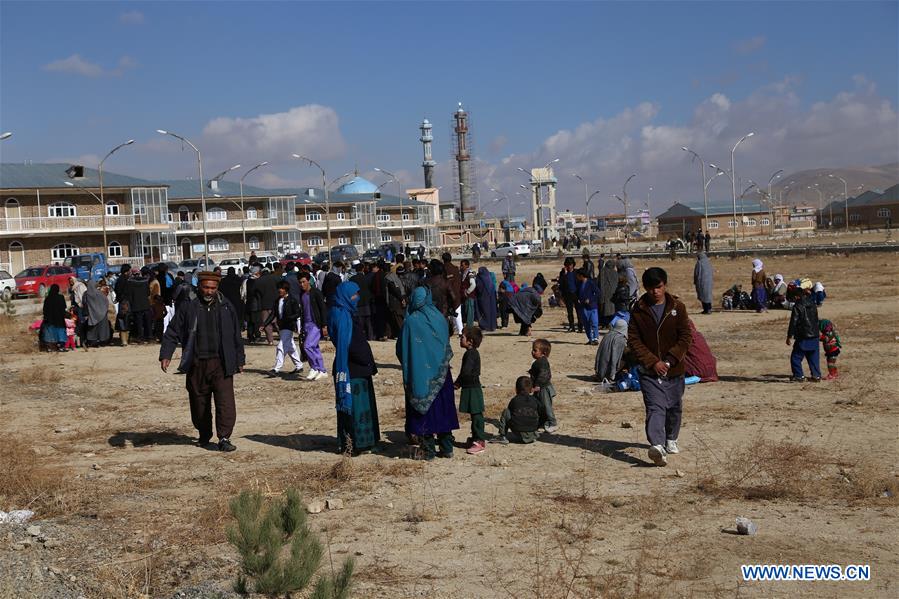Dialogue option called on for Afghanistan
- By Daniel Hyatt
 0 Comment(s)
0 Comment(s) Print
Print E-mail China.org.cn, November 15, 2018
E-mail China.org.cn, November 15, 2018

When stakeholders of peace in Afghanistan sit together, the debate is almost always centering over sticking to the military option or pursuing dialogue. With civilian losses rising 39 percent year-on-year and reaching the highest since 2014, few sane minds are advocating for the former.
The war has continued to grow deadlier – killing an average of 30 to 40 Afghan soldiers and 10 civilians every day, according to a New York Times report on October 7, 2018. With every single one of them gone, it leaves another family devastated and pushes the country another step towards the socio-economic collapse.
Afghanistan's losses have spiraled on many levels. Repeated attacks on schools, for example, have been affecting children's education and consequently the nation's building process. Likewise, no significant water conservation projects have been launched as a result of the war, thus causing severe drought in western parts of the country.
The second largest stakeholder in the war-torn country, after its own people, appears to be the United States. Yet Americans believe that their government has failed in this conflict of seventeen years. According to research carried out by Washington-based Pew Research Center, about half of adult U.S. citizens (i.e. 49 percent) reckon that their country has not been able to achieve its goals in Afghanistan. Only 35 percent, on the other hand, are optimistic about the war's results.
This is exactly why President Donald Trump's Afghanistan policy needs a reality check. Despite a continuous increase in casualties, nobody in the administration has been able to convince him to give it a revisit. During the presidential campaign, he considered it convenient to announce a swift U.S. withdrawal from Afghanistan, but as shocking as his victory in the election was, the announcement saw a complete reversal.
Last August annulling his commitment as an "original instinct to pull out," Trump pledged to send more troops and vowed "a fight to win." A year later, there is no stability in Afghanistan and the changeover from Obama to Trump has not ensued any shift in balance of power among the belligerents.
And all this while, the U.S. has been placing the blame of its Afghan-policy failure on Pakistan, disregarding the fact that Pakistan's ability to influence Congress and Pentagon advisories would ironically be an overestimation. Since any improvement in Afghanistan has not emanated from this finger pointing, it has to be understood that Pakistan is not part of the problem – it is rather part of the solution.
Afghanistan and Pakistan share age-old cultural and economic ties. Any security-related situation in one of them immediately affects the other. Afghanistan's ongoing insurgency also spilled into western regions of Pakistan where locals suffered the most.
Pakistan is today advocating at all global forums for a peaceful and dialogue-based settlement of issues that threaten Afghanistan. Pakistan encourages taking all major stakeholders onboard for any possible solution that can avoid the military option.
The U.S. has been voicing for a peaceful settlement too but the multi-billion-dollar war speaks otherwise. Foreign Minister Shah Mehmood Qureshi firmly conveyed Pakistan's reservations when meeting his counterpart Mike Pompeo last month after the U.S. discontinued reimbursing costs of the war on terror to Pakistan. The interaction nevertheless culminated on a positive note by breaking some ice.
At the same time, a new bloc having major concerns on Afghanistan has been emerging. Pakistan, China, Russia, and Iran are making joint efforts to end the conflict since the security situation in Afghanistan is bound to affect them. The four countries have held discussions to hammer out a solution to the longstanding issue and bring peace to the region.
China and Pakistan have specifically been working with Afghanistan to come up with strategies that can streamline the rebuilding process. The first foreign ministers' dialogue between the three was held in December last year where a consensus was achieved on adopting an "Afghan-led and Afghan-owned" reconciliation process.
While the second meeting in this series is due any time this year, Russia has just concluded a landmark conference of major countries of the region, including China and Pakistan, to chalk out a dialogue-based strategy for Afghanistan.
It is now the region's unanimous assessment that war cannot go on in Afghanistan for eternity. If the stalemate has to be broken, the 17-year bombing of the landlocked nation should be wound up with a launch of a Marshall plan that is guaranteed by the international community. Peace will then be achieved by establishing self-sustaining educational facilities, generating profitable economic opportunities and speeding up the rebuilding process.
Daniel Hyatt is a Pakistan-based freelance journalist and commentator.
Opinion articles reflect the views of their authors only, not necessarily those of China.org.cn.






Go to Forum >>0 Comment(s)